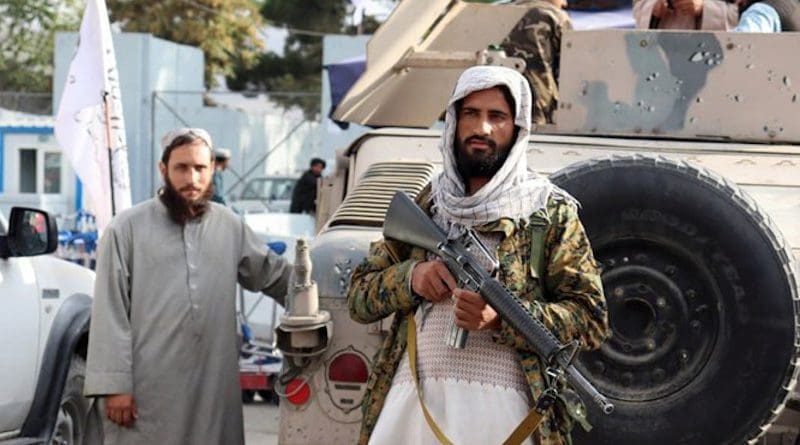Taliban Decisions Reflect Internal Disagreement – Analysis
By Abdulkader Sinno*
When the school year began in Afghanistan in March 2022, journalists were poised to cover the return of girls to secondary education. Taliban leaders in Kabul had committed to allowing separate education for girls so long as they followed the Taliban-mandated dress code. Instead, the cameras recorded disappointed girls being sent back home.
The Taliban’s decision-making process is opaque to many observers and policymakers in the West. While the Taliban’s decisions are not necessarily good for Afghanistan, they do have organisational, doctrinal and cultural underpinnings. Western leaders cannot formulate meaningful policies towards Afghanistan if they do not understand the Taliban’s decision-making processes.
The Taliban administration is not structured like a Western state. It takes many years for an insurgent organisation to transform itself into a state apparatus. The Taliban government in Kabul plays an important role, but the supreme council in Kandahar, in the demographic Pashtun hinterland of the Taliban, is the ultimate arbiter in any decision-making. The secretive Kandahar council, or shura, exists to protect key leaders from assassination attempts and to provide leadership in case of another foreign invasion.
It was the Kandahar shura that overruled the Kabul government’s decision to let girls attend secondary school. Observers speculate that the dividing line is theological, with the younger and more open leadership in Kabul being overruled by the ultra-conservative leadership in Kandahar.
Another reason behind the sudden backpedal may be the desire to punish the West for its devastating sanctionson Afghanistan — sanctions that most Afghans, including women, consider harmful. Shura leaders know that Western countries have tried to retroactively justify their costly and destructive twenty-year involvement in Afghanistan by reframing it in terms of women’s rights. The decision to sacrifice girls’ education is in this sense an attempt to retaliate against Western sanctions and their perceived disregard for Afghan livelihoods.
Such tactics have been employed by the Taliban before. In 1999, when the country was already on the brink of a humanitarian crisis, the Clinton administration imposed harsh sanctions on Afghanistan. When a delegation of foreign envoys offered the Taliban a large sum of money to restore the Bamiyan Buddha statues — heritage icons built in 544 AD — but were unwilling to provide humanitarian aid to Afghan children, the Taliban responded by destroying the statues. Taliban leaders responded to criticism by stating ‘if you are destroying our future with economic sanctions, you can’t care about our heritage’.
Banning girls’ education or destroying the Bamiyan Buddhas as a form of protest may seem self-defeating, but Taliban leaders believe that expressing disagreement is important even if it comes at a cost. These are also acts of desperation by leaders who have limited options in the face of economic sections and general Western indifference.
The Kabul officials acquiesce to the leadership in Kandahar to avoid fitna — internal conflict that would weaken the Taliban state. All Taliban officers commit to follow the leadership’s orders to avoid fitna. For Taliban leaders, maintaining the integrity of the Taliban takes precedence over the substance of a disagreement.
Another source of frustration for the West is that Taliban leaders make public commitments that their rank-and-file officers regularly violate. For example, there are documented cases of killings and abuse within Afghanistan, despite a blanket Taliban amnesty for their opponents.
The consensus among Western policymakers is that the Taliban has an effective public relations machine that masks the organisation’s unsavoury behaviour. Another explanation may be that the Taliban lacks good monitoring and control mechanisms, and instances of violence are the product of unchecked autonomy. While the West is unlikely to ease its sanctions so long as these killings continue, it is important for policymakers to understand the various reasons behind such incidents.
Decentralisation was key to Taliban survival when fighting the overwhelmingly more powerful US-led Coalition forces. If the Coalition managed to defeat one Taliban group, others remained intact and fully operational. Today’s Taliban commanders have assumed administrative and policing positions but the organisation has not developed the centralised hierarchies and monitoring mechanisms needed to make these units work as a cohesive whole.
Another factor that shapes Taliban actions is the community in which they are embedded. In many rural Pashtun areas, the Taliban are among kith and kin and reflect the values of their environment. In minority areas and in larger cities such as Herat, Kabul and even Kandahar, the Taliban are imposing a new order that sometimes engenders resistance. Many Taliban see urbanites and minorities as cultural strays in need of paternalistic guidance and advice to return to traditional values, hence the reestablishment of the socially repressive and ever-expanding morality ministry.
Current policies towards Afghanistan assume that the Taliban make decisions the same way Western officials do. To pressure the Taliban, the West is purposefully strangling the economy of one of the poorest countries in the world by isolating its banks and freezing its financial deposits. These sanctions hurt Afghanistan’s ordinary citizens and do not lead to the desired changes in Taliban decision-making. As one Afghan woman said in a media interview — ‘sanctions on the Taliban will kill us faster than the violation of our rights by the Taliban’.
If Western countries care about Afghan women, they need to revise their policies. Sanctions on Afghan banks should be lifted so that citizens can access their financial deposits, benefit from remittances and engage in trade. The lives of Afghans should not be held hostage to Western concerns about the Taliban’s behaviour, particularly when Western policymakers appear unable to influence this behaviour.
*About the author: Abdulkader Sinno is Associate Professor of Political Science and Middle Eastern Studies at Indiana University.
Source: This article was published by East Asia Forum

